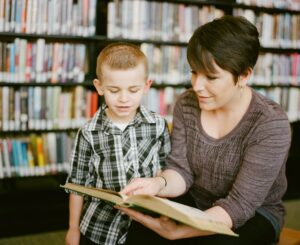
When children are learning to read, it is not unusual for parents to worry about whether their children are progressing typically and reading at a similar level to their peers. It’s helpful to understand what is developmentally appropriate when it comes to reading. And if there is a reading problem, where to look for support.
Reading Progression
Reading skills begin to develop at an early age, often before a child even begins school. As children are exposed to books, by being read to and having books to explore on their own, they start learning about how books work. For example, they learn where the front of the book is and how to turn the pages. They start understanding that we read pages from left to right. They also learn that we read words from left to right. As children explore the pictures, they learn that pictures help represent what the print is saying. Along with this concept, children begin recognizing that print carries meaning.

It is not uncommon to see young children “reading” books by making up stories as they turn the pages. These are excellent early reading behaviors. Children progress to reading simple texts, often with one sentence per page, paired with a picture. These first books generally follow a predictable pattern and repeat certain high-frequency words throughout. From there, children develop the skills to read higher-level texts. With more words, they learn different types of sentences, and more complex story lines.
It is important to note that all children do not at the same rate when it comes to reading. Just as babies learn to walk, talk, and hit other milestones at different stages, children develop their literacy skills at various rates. When we consider a class of kindergarten students, some may be exploring books and focusing primarily on the pictures, while others are reading pages containing multiple sentences. These differences alone do not necessarily cause alarm.
Identifying Reading Challenges
Reading is a very complex process. It may seem simple for those of us who can do it fluently, but when you break it down into parts, reading is a very involved activity. For starters, it requires us to recognize words. We need to attend to punctuation, and constantly think about what we’re reading as we comprehend, infer, and predict to make sense of the text.
Educators employ a wide variety of strategies and activities to teach children how to read. Shared reading, guided reading, phonemic awareness games, and high-frequency word activities are just a few of the instructional approaches used to teach reading. When children struggle with reading, educators work towards identifying the specific areas that are presenting challenges. For example, children may need to develop a greater bank of sight words. Or, they may be struggling to apply strategies when they come upon unknown words. Once specific areas of difficulty are identified, educators can tailor their programming to offer support.
Two areas that educators often see difficulty with are fluency and comprehension. If a child’s reading is slow and robotic or rushed and inaccurate, there may be fluency issues. Difficulties with comprehension occur when a child struggles to understand what he is reading. Educators can assess both these areas of reading, implement appropriate programming, then reassess to ensure progress is being made.
Reading Supports

It is certainly possible for a child who initially demonstrated difficulties learning to read, to begin progressing and no longer experience significant challenges. Often, targeted support helps a child to overcome the difficulties they encountered. It’s important for reading support to be tailored specifically to the child and to be offered regularly. Also, to occur over a long enough period of time to measure changes.
When appropriate support has been implemented and a child continues to struggle, parents and educators may look to other professionals to help identify the possibility of underlying learning challenges. For example, a psychologist can complete a psycho-educational assessment to measure a child’s intellectual and academic abilities. These assessments provide rich information about how children learn best, their areas of strength, areas that are weaker, and strategies that can support them. Assessments typically include recommendations regarding strategies that can be used at home and at school to support a child’s learning.
Strategies for Reading Problems
If less developed areas are identified, a psychologist can recommend strategies and instructional supports to strengthen those skills. It may be helpful for a special education teacher to provide small-group programming, targeting the identified areas of need. Additionally, children can learn to use other strategies, such as text-to-voice technology, to support their reading. This allows them to continue exploring age-appropriate texts, without the need to decode the words themselves. They can have texts read aloud in order to do research, to have instructions delivered, and for enjoyment. Text-to-voice technology can be very beneficial by providing children with opportunities to interact with texts that are age-appropriate and easy to comprehend but difficult for them to read on their own.
As children learn to read, try not to make comparisons and keep in mind that it is like a developmental milestone that varies from one child to the next. Just like there is no specific date when a child must take her first step, there is not a specific date when a child must know how to read. If you have concerns, reach out to educators for guidance. Many will have dozens, if not hundreds of experiences helping children develop literacy skills. Partnering with them will make sure your child is receiving the best support possible at both home and school.
Leave a Reply